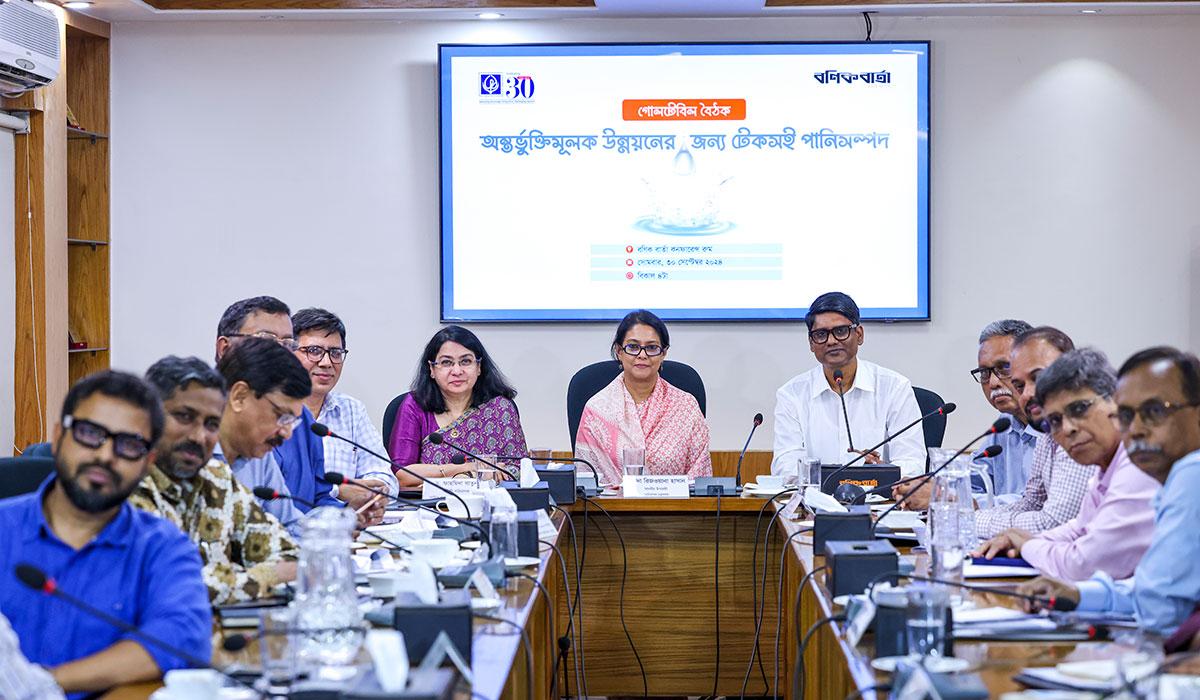
Sustainable water management is essential for the preservation of water resources, upon which much of the country’s economic structure depends. The scope of water is vast, considering economic, social, and environmental contexts. However, unplanned management of this sector is causing suffering across all segments of society, while encroachment and pollution are destroying most rivers. To protect water resources, we must develop sustainable and updated water management strategies. Instead of focusing on project-based initiatives, attention must be given to finding more effective and impactful solutions.
In this context, Centre for Policy Dialogue (CPD) and Bonik Barta jointly organised a roundtable titled ‘Sustainable Water Resources for Inclusive Development’ on Monday, 30 September 2024. The roundtable discussion focused primarily on groundwater, especially in relation to Bangladesh’s national boundaries. The conversation highlighted the impact of industrialisation on water resources — on one side, it is depleting our water supply, while on the other, water is being used excessively. In agriculture, Bangladesh is dealing with water shortages in some regions, while overusing water in others.
In her Keynote Presentation, Dr Fahmida Khatun, Executive Director of CPD, addressed the interconnectedness of economic transformation, social inclusion, and environmental sustainability with water. She noted the significant economic transformation in Bangladesh, highlighting a structural shift from agriculture to industry and then to the service sector. The service sector’s contribution to the economy has become increasingly significant, followed by the industrial sector, while the contribution of agriculture has declined.
Dr Khatun emphasised that despite the decline in agriculture’s contribution to GDP, it remains crucial for both employment and food security. She also stressed the importance of environmental sustainability, pointing out that while there has been significant progress in access to safe water and sanitation, access remains unequal. In cities like Dhaka, the quality of surface water is deteriorating, and pH levels in many rivers are alarming.
She highlighted concerns about groundwater depletion in several areas of Bangladesh, emphasising the need to address these regional challenges. Dr Khatun also discussed social inclusion, drawing attention to data showing that low-income families have limited access to treated water and sanitation facilities. A 2017-2018 survey revealed that just over 10 per cent of families have access to drinking water, underscoring the severity of water inequality.
To address these challenges, Dr Khatun outlined various policies, including the National Water Policy, which was implemented some time ago, along with other initiatives like the National Disaster Contribution (NDC), the National Biodiversity Strategy and Action Plan, the Five-Year Plans, the Delta Plan 2100, and the National Adaptation Plan (NAP). These policies all emphasise the need for water resource management.
‘Various ministries and departments, including the Ministry of Water Resources, the Ministry of Local Government, and the National River Protection Commission, are responsible for managing water resources’ underscored the Executive Director of CPD.
She stressed that water management is a multi-sectoral issue, requiring coordination across different government bodies. Looking to the future, she emphasised the need for a development model that integrates society, the economy, and the environment, and called for a focus on sustainability and inclusivity in water management.
Dr Khatun advocated for updating the National Water Policy to address emerging challenges and called for better coordination between ministries. She also highlighted governance as a critical issue, noting that water resources are often mismanaged and rivers and water bodies are encroached upon for commercial purposes. She concluded by stressing the need for improved governance, stronger law enforcement, and greater involvement of local communities and stakeholders in water management.
Chief Guest Advocate Syeda Rizwana Hasan, Advisor, Ministry of Environment, Forest and Climate Change, Interim Government of Bangladesh, remarked that Bangladesh faces a multitude of water-related issues, including arsenic contamination, salinity, pollution, and plastic waste. She criticised the country’s over-reliance on large-scale water projects, questioning whether public funds are being optimally utilised. She also noted that many projects are politically motivated and fail to engage local communities, local government, and relevant authorities, which would make them more cost-effective.
At the roundtable, BRAC University’s Emeritus Professor Dr Ainun Nishat pointed out that Bangladesh’s food security has been dependent on water resources and advocated for restructuring the Water Development Board into a Water Management Board.
Mr Abu Taher Khan, Former Director of BSCIC, and other panellists echoed the importance of rivers and urged raising public awareness about restoring water bodies like canals and ponds, especially in rural areas.
The roundtable featured other prominent speakers from academia, government agencies, and non-governmental organisations, who all emphasised the importance of sustainable and community-centred approaches to water resource management.


